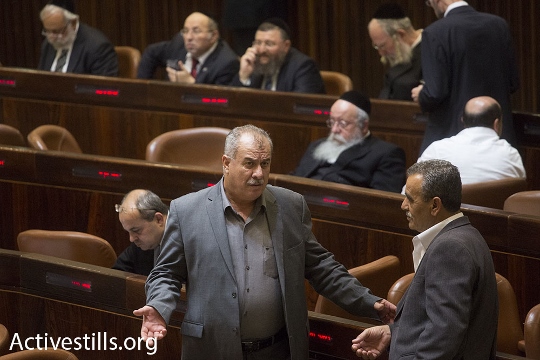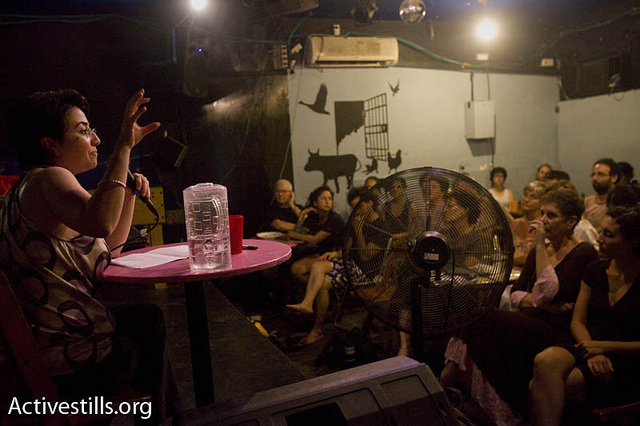Raising the Knesset threshold was a game-changer, and now the Arab parties must find a way to unite in order to stay relevant. Will they put aside their egos and political differences for the sake of Israel’s Palestinian minority?

A war of attrition has been declared on the Palestinian minority in Israel, in the wake of endless discussions over the possibility of uniting the Arab parties to run in the upcoming elections. It turns out that Arabs are not really connected to realtime: with every passing week, simple folk such as myself (not to mention 60 percent of the Arab public) who are not active in any political party, are feeling more and more distant. Our trust is dwindling, our skepticism is increasing, and we cannot help but make fun of our leaders’ inability to find the perfect formula. Put simply: how the hell can they fit nine Arab men and one good Jewish man in the same list as a woman or two? You add four more candidates, one from each party, that’s how.
The only thing currently working is the tidal wave of names and descriptions ascribed to the arduous unity process: the term “united party” is no longer relevant; a “united list” may be a better fit. Or what about “strategic unity”; “a fictitious marriage” that will give birth to an “illegitimate child”; or the cherry on top: “the talks between the factions are akin to prostitution and an abandoning of principles.”
We’re getting carried away, if you ask me. It is as if we are talking about a historic agreement that will forever change the political map. We all know that the Arab parties (along with the Arab-Jewish Hadash party) are seen as one bloc anyway. So why break it up now? And how is it that every party seems to be providing its own polls that show that its power is only growing, and that the Arab public has chosen it to lead?
Barakeh’s strange comeback
The problem is that we are already past the stage of fruitless secret talks, and have now entered the stage of emotionally blackmailing the Arab public, coupled with mutual accusations. Ahmed Tibi’s parliamentary aide whined on Facebook that “my brothers hate me, father,” alluding to a famous poem based on the Quranic story of Yusuf. In the 2015 version of the story, Tibi represents Yusuf, who is excluded from the talks for no reason other than his success and the fact that others are envious of him.
Meanwhile the Islamic Movement has gotten a divorce from its successful marriage to Tibi’s Ta’al party, and has subsequently begun negotiating with none other than the secular Hadash party. The plan is that Nabila Espaniola (who is Christian) will solve the issue of women’s representation in the Islamic Movement, whose green flag has been turning slightly red over the past few weeks.
And Balad, a party that supports renewal, women and young people, has been stuck without the opportunity to renew, not to mention pass the election threshold by itself. They need Haneen Zoabi, as the entire Knesset is against her. According to one Hadash activist, no one will dare try and replace Zoabi, since doing so would be a capitulation to the extreme right. And justifiably so – there are people whose place in life is dictated by luck, meaning they don’t have to lift a finger. In Zoabi’s case, it is both luck and the far right. Alongside her is Basel Ghattas, who just made it into the Knesset and deserves another shot.
+972 poll: Joint Arab list would raise voter participation
Jamal Zahalka cannot be replaced, since it is irresponsible to leave the political arena and the united list to Tibi and Hadash’s Mohammed Barakeh. This is especially true after Barakeh’s return, which was so quick that I didn’t even have time to throw the newspaper with his career-spanning exit interview [Hebrew] into the recycling bin (yes, some Arabs recycle, and some even use newspapers to clean their windows).
This is Barakeh’s big chance to lead the Arab public in a united list – a wet dream of every male politician, Arab, refugee from Saffuriya, polished and well-spoken, who smelled the opportunity before it got to be too late. He will return (big time!) as the “mukhtar” – the responsible adult who will save the day and stand at the head of the list, since no one can replace him at the moment.
With all these complexes in place, it will be difficult to include women, young people, academics, Christians, Druze, Bedouin and representatives of mixed cities in the equation. And we have yet to even speak about a political agenda, programs, division of labor, priorities, the war on racism, poverty, racism and the most obvious questions: how do the parties break up after the election and return to their natural place? And what do they say to their supporters in order to come out feeling righteous, so that the voters think they did everything to support the united list, as opposed to those other pesky parties? There are many challenges facing the negotiating team, which has yet to sit together at the same table. Egos are sky-high and the level of intelligence is at an all-time-low.
Compared to Syria we’re doing just fine
And myself? I am following in the footsteps of my father, who told me a few days ago: “Even if a tow truck drags me to the ballot box, I won’t move from my couch without a united list.”
“Why,” I asked him, “in any case you understand how this dirty game works.”
“Because I am sick of them,” he tells me. “There are a few of them in the Knesset who really work hard, while all the rest just stand in line at the employment office. They have failed at almost everything – or perhaps they were destined to fail. Fine, I accept that. But at the very least they must succeed in uniting. This depends solely on them.”
I searched in my own political history for a reason that this naive wish might come true, just this once. I couldn’t find a trace that could lead me to a decent explanation. Okay, perhaps it is because I don’t have this kind of history.
My explanation, which relies on my gut instinct, is that the current situation is due to what has happened to the Arabs throughout history: we have been divided, weakened, occupied and defeated. The last person who could unite the Arab world was Nasser, who united Egypt and Syria (although this unity eventually broke down). The longing for unity has remained a constant source of hope in Arab history – an illusory cure for all our problems. Look at what is happening in the Palestinian Authority and Gaza, in Hamas and Fatah, in north and south Yemen, in Lebanon and Syria, in Libya. When compared to all these, uniting the Palestinian citizens of Israel seems like a rather easy task.
At the end of the day, the orchestra will be assembled. Every player will play his or her own instrument, while claiming that someone else is out of tune. Under Maestro Liberman, “the United Arab Orchestra” will finally be able to play one normal piece. The show will go on. Somehow.
Samah Salaime Egbariya is a social worker, a director of AWC (Arab Women in the Center) in Lod and a graduate of the Mandel Leadership Institute in Jerusalem. This article was first published on +972′s Hebrew-language sister site, Local Call. Read it in Hebrew here.
Related:
+972 poll: Joint Arab list would raise voter participation
If Herzog wants to lead, he’ll need to bring the Arabs with him




